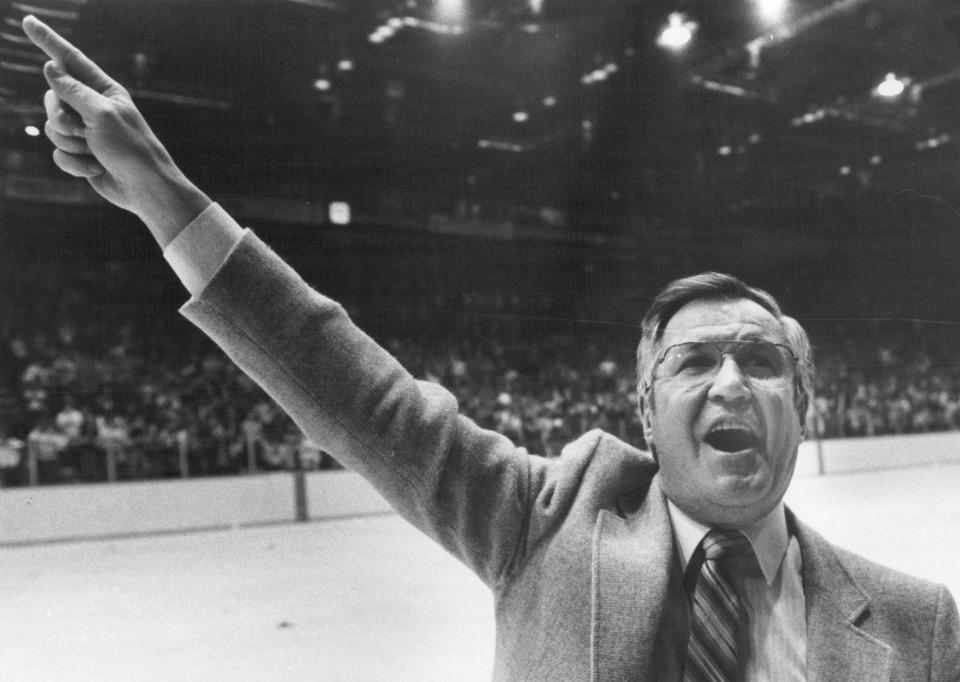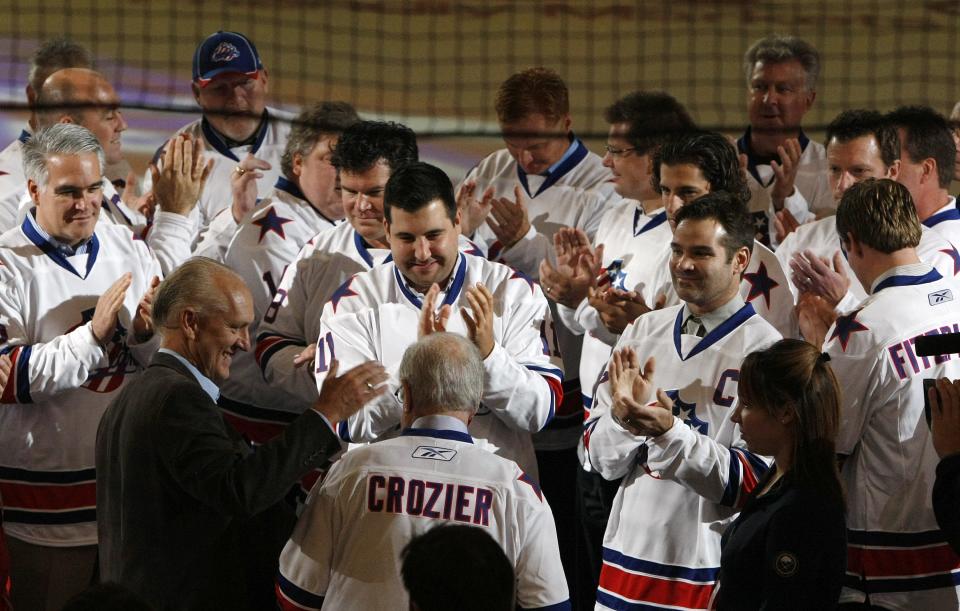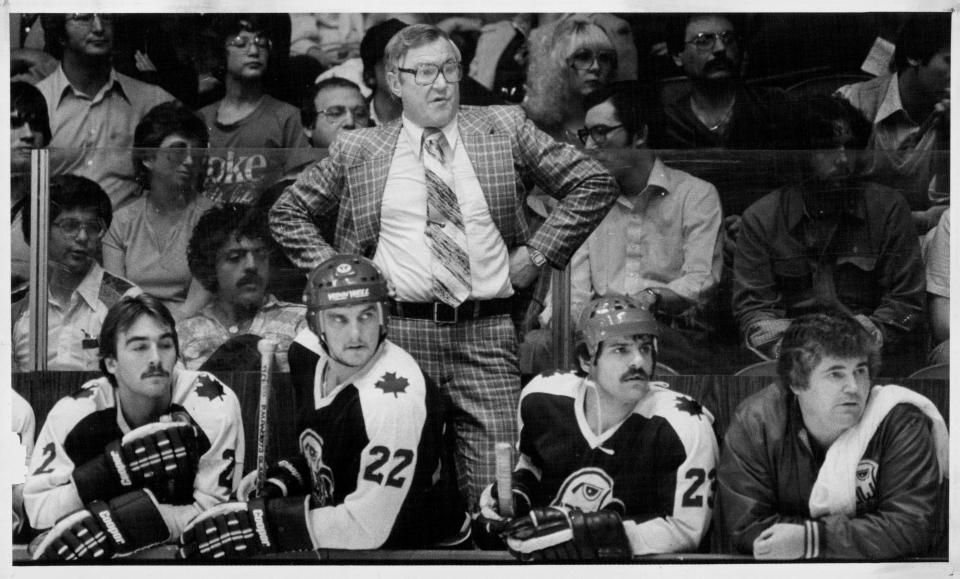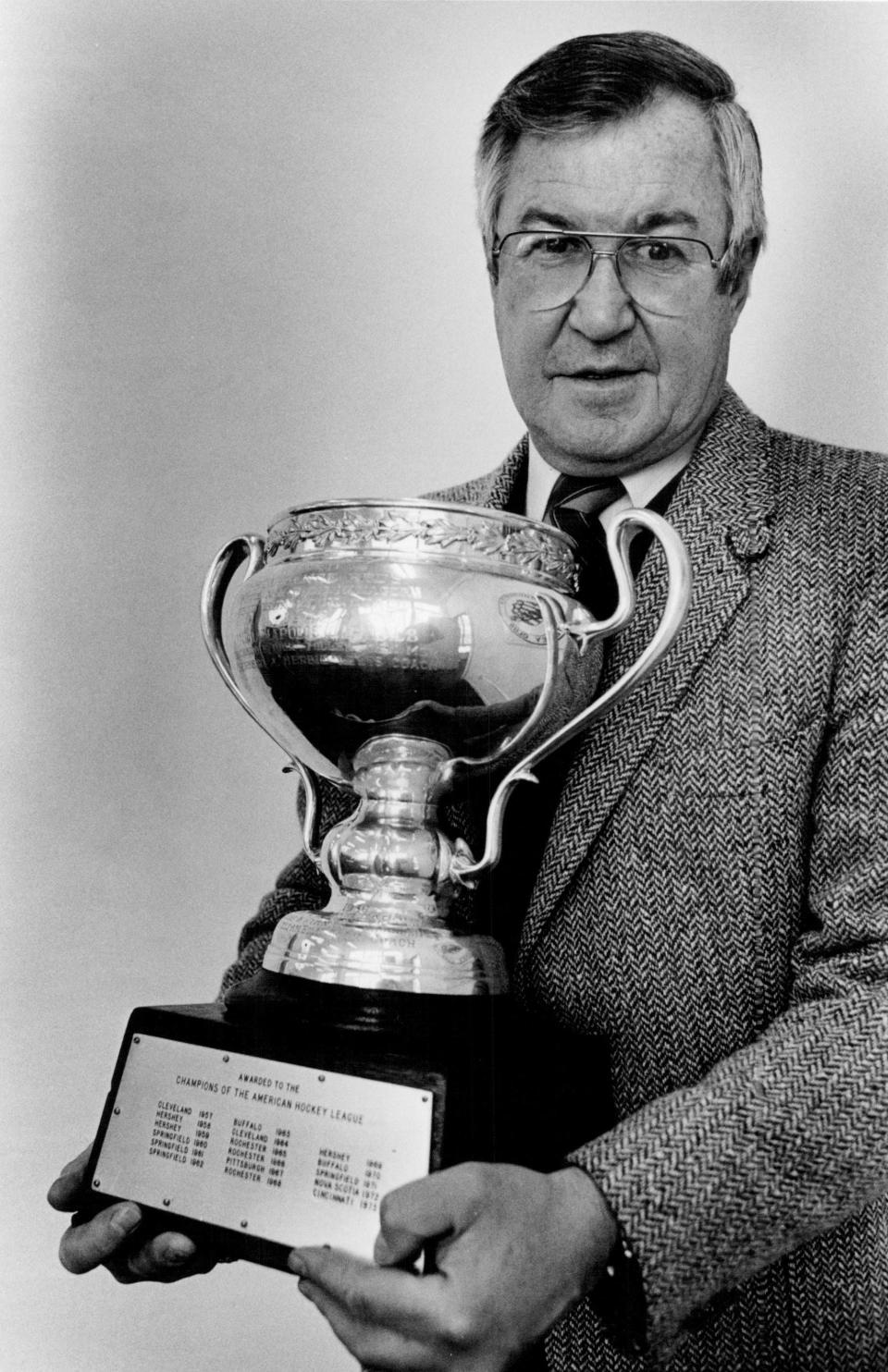'He got the best out of everybody.' Legendary Amerks coach Joe Crozier dies at 93
- Oops!Something went wrong.Please try again later.
Joe Crozier, who forged his legend in Rochester by coaching the Amerks to three Calder Cup championships in a four-year span in the mid-to-late 1960s, died Tuesday night at the age of 93.
The man who was lovingly known as “The Crow” played defense for parts of the 1959-60 and 1960-61 seasons for the Amerks before retiring at the age of 32 to go into coaching.
Crozier’s coaching career was circuitous and involved many stops along the way, including nearly three years in the NHL as coach of the Buffalo Sabres and part of one season with the Toronto Maple Leafs, but his time in Rochester was unmatched in his estimation.
“My town,” he often proclaimed, and it was true. Rochester was the Crow’s town and he never forgot it, nor did he ever not let you forget it.
“You have to know that my dad absolutely loved Rochester,’’ Crozier’s son, Rich, told the Democrat and Chronicle several years ago. “When we were kids and playing youth hockey, we went to Rochester all the time for games. As we pulled in, or when we passed the sign reading ‘Rochester,’ he’d always say the same thing, ‘Guys, this is my town.’”

Born in Winnipeg in 1929, Crozier never quite had what it took to make it as a player in the NHL, but he played more than 12 seasons in various minor leagues, most prominently with the Quebec Aces where he first came in contact with Punch Imlach, a man who would have a huge influence on Crozier’s career.
Imlach was the coach and general manager of the Aces who played in the Quebec Senior Hockey League and Crozier and future Hockey Hall of Famer named Jean Believau were the star players on the team in the early 1950s.
While Believau moved on to the NHL’s Montreal Canadiens, Crozier remained with the Aces as a player for a few years, and then his duties increased exponentially when he, Imlach and a couple other investors bought the team.
More:Many sides of a champion: How legendary hockey coach Joe Crozier put family first
For a short time, Crozier was a player, coach, general manager and owner because Imlach had left in 1957 to become coach of the Springfield Indians, the Boston Bruins farm club in the American Hockey League.
After a year, Imlach became head coach of the Toronto Maple Leafs and he convinced Crozier to sell his shares in the Aces and go to Rochester - Toronto’s farm club in the AHL - as a player.
It was Imlach who late in the 1959-60 season called Crozier up to the Leafs, and at the age of 31, Crozier played the only five NHL games of his career.
Crozier returned to Rochester for one more season, scoring 14 points in 35 games, then retired as a player in the spring of 1961. Knowing his future in hockey was as a coach, general manager, or both, he went to Charlotte of the Southern League, to, as he said, “learn the business.”

Two years hence, suitably trained, Imlach called Crozier and asked him to come back north and coach Rochester in the AHL.
In his first season, 1963-64, the Amerks made the playoffs but lost in the first round to Cleveland. Over the next four seasons - with all-time Amerk greats like Al Arbour, Larry Hillman, Bronco Horvath, Dick Gamble, Don Cherry and Gerry Cheevers - the Amerks won eight of nine postseason series, winning the Cup in 1965, 1966 and 1968 and losing in the Finals in 1967.
“I felt I was one of the better coaches because I had a great teacher,’” Crozier said of Imlach. “He was the best coach and general manager that ever existed. He had brought me along, helped me in a lot of ways.”
Cherry once said, “We played in four championships in a row and won three. We were so good that NHL teams wouldn’t play exhibition games against us. Joe had everyone’s number and knew how to motivate people. We had great clubs, no mistake about it, but a lot of people have great clubs and can’t get the best out of them. Joe, he got the best out of everybody. He was a winner.’’
Crozier left to coach the Western League’s Vancouver Canucks in 1968-69, and eventually, when Imlach was hired to be the first coach and general manager of the expansion Buffalo Sabres in 1970, he brought Crozier back to coach the AHL affiliate in Cincinnati starting with the 1971-72 season.

However, halfway through that year, Imlach suffered a heart attack and Crozier was brought up to be the new coach of the Sabres. “To me, this is a mission of help for the best friend I have in the world,” Crozier said at the time. “I’ve waited a long time to make it to the National Hockey League, but believe me, I’d rather never have made it than do it under these circumstances with Punch sick.”
With Imlach scaling back to just his GM duties, Crozier became the full-time head coach in 1972-73, and he guided a young Buffalo club through a magical season which ended with the franchise’s first playoff berth in just its third year of existence.
And Crozier made a decision that ultimately set the Sabres on a winning course for the rest of the decade when he put together the famed French Connection line of Gilbert Perreault, Rick Martin and Rene Robert.
Perreault and Martin were already with the team when Crozer took the reins, and then late in 1972, Robert was acquired in a trade from Pittsburgh. Crozier knew exactly what to do.
“Robert was the guy I wanted for that right wing,” said Crozier, who played a key role in the acquisition. “It was all discussed ahead of time that it was very important we had a guy in that spot. I knew Rene a long time from the American league, and he was a piece of the puzzle. He had a lot of talent, a lot of experience as far as reading plays. I knew what he could do, what type of person he was, so we went and got him.’”
The French Connection became one of the most lethal lines in the NHL and it helped the Sabres reach the Stanley Cup Finals in 1975, though by then, Crozier was gone.
Imlach, in a decision that was one of the toughest of his career, fired his good friend at the end of a disappointing 1973-74 season when the Sabres missed the playoffs, and he replaced Crozier with Cincinnati coach Floyd Smith.
It was not a popular move in the locker room because while Crozier could be a hard-driving coach, especially in practice, the players loved him.

“He wanted one thing from a player, and that was for you to give everything you had on the ice, and if you didn’t do that, you were in trouble with him,” Jim Lorentz said. “That’s what I respected most about Joe. I thought Joe was a great coach for that particular team because we needed discipline, and he gave us that discipline. That was important. We needed direction and he gave us direction.’”
And it didn’t matter if the player was a rookie, all-time great like Tim Horton, or a future all-time great like Perreault, Crozier was tough on everyone.
“We always worked hard because that was our job,” Perreault said. “Joe didn’t like to lose so everytime we had a little bit of a struggle, Joe was there to really give it to us with hard practices. Every coach, that’s his job, to do that to keep pressure on the players and make you realize you have to work hard to be a winner.”
Crozier bounced around the coaching ranks after he left Buffalo, leading Vancouver and Calgary in the World Hockey Association, and later, with Imlach back in Toronto as GM, he brought in Crozier for the 1980-81 season but fired him halfway through the year when the team started poorly.
Eventually, Crozier made his way back to the Sabres as a consultant and ambassador, and he even returned to Rochester to coach the Amerks in 1983-84 after Mike Keenan, fresh off a Calder Cup championship in 1983, left to coach the University of Toronto. Crozier guided that team to another Calder Cup final, losing to Maine.
Crozier was an inaugural inductee into the Amerks Hall of Fame in 1986, and he was later inducted into the Sabres Hall of Fame in 2010 and the AHL Hall of Fame in 2012.
Crozier’s Amerks record was 256-154-30. He remains the winningest coach in the 67-year history of the franchise in terms of points percentage at .616; his 256 victories are third behind only Randy Cunneyworth (340) and John Van Boxmeer (337); his 39 postseason victories are No. 1; and in the annals of the American Hockey League, he is one of only six coaches to win at least three Calder Cups.
He once described his coaching philosophy this way:
“My strength was teaching and motivation in the locker room,” Crozier said. “There were so many things I taught them, they probably got sick and tired of listening to me, but I had to give it to them if they were going to improve.
“I believed in teaching in any hockey I ever coached. I always looked at coaches and thought there was more than just skating and shooting. I’ve always thought you could teach players how to play and how to play better. That was my theory.”
Sal Maiorana can be reached at maiorana@gannett.com. Follow him on Twitter @salmaiorana.To subscribe to Sal's new twice-a-week newsletter, Bills Blast, please follow this link: https://profile.democratandchronicle.com/newsletters/bills-blast
This article originally appeared on Rochester Democrat and Chronicle: Joe Crozier, legendary coach of Rochester Americans, dies at 93

